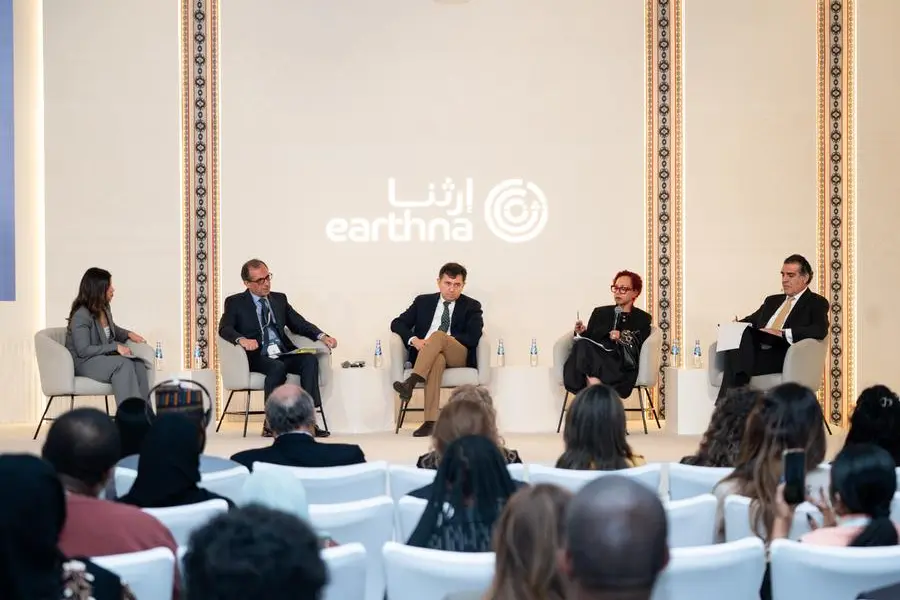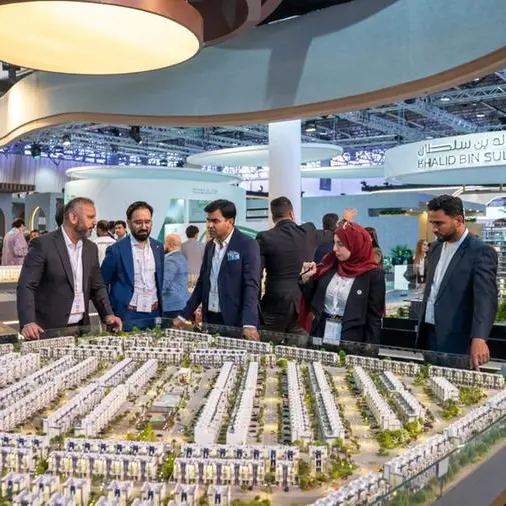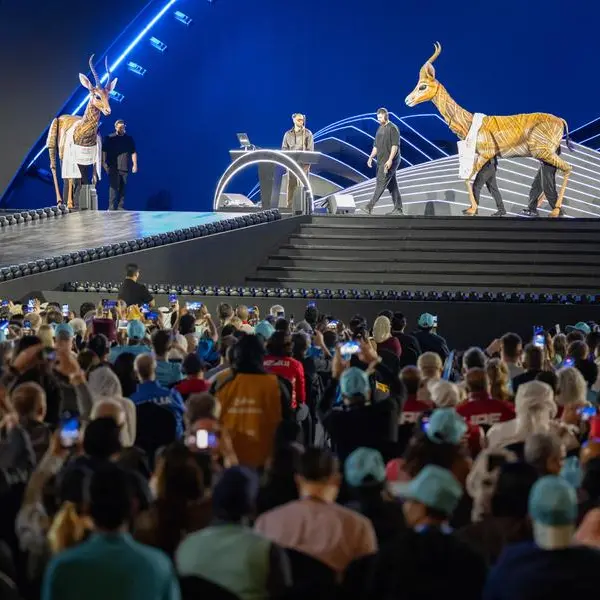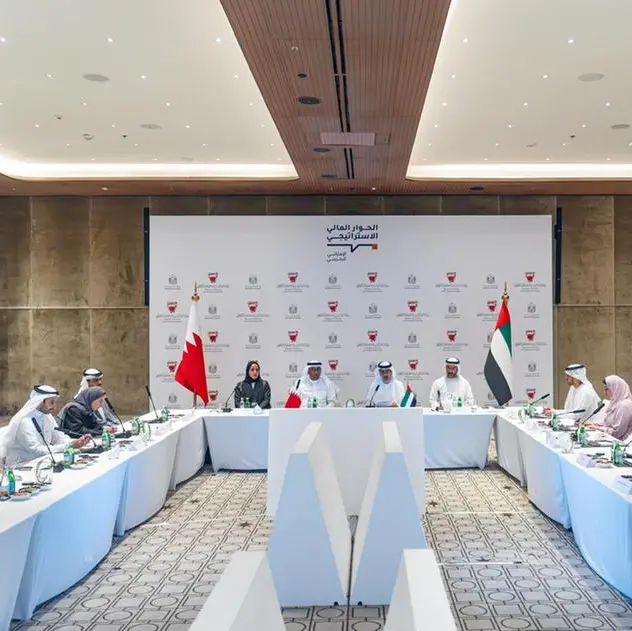PHOTO
Doha, Qatar: The Earthna Summit 2025, organized by Earthna Center for a Sustainable Future, a member of Qatar Foundation, concluded today after two transformative days of cross-sector collaboration, bold ideas, and inclusive dialogue under the theme ‘Building Our Legacy: Sustainability, Innovation, and Traditional Knowledge’.
The Summit drew more than 2,000 attendees, further solidifying Earthna’s role as a leading convenor for sustainability innovation in hot and arid regions.
Day two opened with a session titled ‘Women Leading Collaboration: Partnerships for Sustainable Development’, which emphasized the crucial role women play in advancing Sustainable Development Goal (SDG) 17: Partnerships for the Goals. The panel brought together leaders from government, diplomacy, and the development sector, focusing on how inclusive leadership is shaping effective partnerships, new financing models, and policies, to accelerate global sustainability efforts.
“It is time to support their leadership with the tools and resources they need, and to walk alongside them in shaping a more collaborative and equitable future. The moment to act together is not coming: it is already here,” said H.E. Ambassador Patricia Espinosa Cantellano, former Executive Secretary of the United Nations Framework Convention on Climate Change and founding partner and CEO of onepoint5. “Change does not happen in isolation. It happens when we invest, innovate, and generate impact together.”
Her Excellency Dr. Hamda Al-Sulaiti, Deputy Speaker of the Shura Council, also spoke during the session, underlining the importance of advancing SDG 17. “It is the voices, vision, and values of women that are forging the most resilient and transformative pathways toward a more sustainable and equitable world,” she remarked.
Curated networking was also a major focus, paving the way for high-level panels later in the day that addressed pressing environmental challenges—from sustainability frameworks beyond GDP to the role of faith-based approaches in advancing environmental stewardship.
Another highlight of the Summit was the plenary session on the Arid Cities Network, where leaders advanced plans for a groundbreaking alliance aimed at facilitating knowledge sharing of climate solutions for arid urban centers.
“What I’ve witnessed here is more than a summit—it’s a movement,” said Rafael López Aliaga, Mayor of Lima. “Over the past two days, I’ve had the honor of reconnecting with peers and engaging with inspiring individuals from across sectors and around the world. There’s a shared energy here—everyone is eager to go home, stay connected, and continue driving forward toward real, scalable solutions. This momentum is only the beginning, and I want to thank Earthna for bringing us all together.”
The roundtable conversations tackled pressing issues, including the challenges facing displaced populations, the insights found in traditional urbanism, and the critical need for regional air quality coordination. Meanwhile, the interactive Agora Sessions and Earthna Village spotlighted community-led solutions, social enterprises, and grassroots innovation, with a discussion examining how traditional architecture and heritage preservation can play a pivotal role in rebuilding cities after conflict, fostering resilience, and reclaiming community identity.
“It has been an honor to host the Earthna Summit in Msheireb—a living example of what sustainable urban innovation can achieve in arid environments,” said Eng. Ali Al Kuwari, CEO of Msheireb Properties. “Cities like ours face immense challenges, but through collaboration, shared knowledge, and bold thinking, we can shape resilient cities for generations to come.”
The Summit was delivered in strategic partnership with the Ministry of Environment and Climate Change, alongside corporate and content partners. These included QF member Hamad Bin Khalifa University’s Qatar Environment and Energy Research Institute and College of Islamic Studies, QF partner university Virginia Commonwealth University School of the Arts in Qatar, Woqod, Msheireb Properties, QF-founded QatarDebate, Ashghal, QF’s Al-Mujadilah Center and Mosque for Women, the Qatar Research, Development and Innovation Council, and QF’s Doha Debates, World Innovation Summit for Health, and global education initiative WISE.
International collaborations included the Middle East Council for Global Affairs, the International Institute for Sustainable Development, Caravane Earth, AIA Middle East, Royal Holloway University of London, the Climate Governance Commission, the United Nations Convention to Combat Desertification, the King’s Foundation, and the International Network for Traditional Building, Architecture and Urbanism (INTBAU).
Earthna Village came to life through dynamic collaborations with the International Trade Center, Hamad Bin Khalifa University’s Qur'anic Botanic Garden, Torba Naturals, Zero Waste Design, Carvers, INTBAU, QF partner university Texas A&M University at Qatar, Royal Thai Embassy, DADU, Hadiqaa, Heenat Salma, and QF’s Herfah at Al Khater House program.
Earthna Center for a Sustainable Future
Earthna Center for a Sustainable Future (Earthna) is a non-profit policy, research, and advocacy organization, established by Qatar Foundation (QF) to promote and enable a coordinated approach to environmental, social, and economic sustainability and prosperity.
Earthna is a facilitator of sustainability efforts and action in Qatar and other hot and arid countries, focusing on sustainability frameworks, circular economies, energy transition, climate change, biodiversity and ecosystems, cities and the built environment, and education, ethics, and faith. By bringing together technical experts, researchers, government and non-government organizations, businesses, civil society, and policy and decision-makers, Earthna fosters collaboration, innovation, and positive change.
Using their home—Education City—as a testbed, Earthna develops and trials sustainable solutions and evidence-based policies for Qatar and hot and arid regions. The organization is committed to combining modern thinking with traditional knowledge, contributing to the well-being of society by creating a legacy of sustainability within a thriving natural environment.
Qatar Foundation – 30 Years of Unlocking Human Potential
Qatar Foundation (QF) is a non-profit organization which, for 30 years, has supported the sustainable human, social, and economic development of Qatar through entities, programs, and initiatives focused on education, science and research, and community development.
QF was founded in 1995 by His Highness Sheikh Hamad bin Khalifa Al Thani, the Father Amir of Qatar, and Her Highness Sheikha Moza bint Nasser, Chairperson of Qatar Foundation, who shared the vision of providing quality education for everyone in Qatar. In the three decades since, this vision has evolved into a globally unique, multidisciplinary ecosystem of knowledge – offering opportunities for lifelong learning, fostering innovation, and empowering people to be socially engaged citizens and drivers of positive change.
This diverse but interconnected ecosystem comprises a world-class education landscape spanning the full spectrum of learning from pre-school to post-doctoral level; research, innovation, and policy centers addressing some of the world’s greatest challenges facing the world; alongside community facilities for people of all ages to seek knowledge, embrace active lifestyles, and expand their horizons within QF’s Education City, spanning 12 square kilometers in Doha, Qatar.
With its efforts concentrated on generating impact in five key areas – progressive education, sustainability, Artificial Intelligence, precision health, and social progress – QF remains committed, as it has been for the past 30 years, to investing in Qatar and its people, and contributing to shaping a better world for all.




















